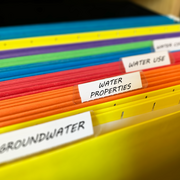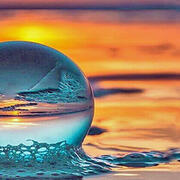Water and electricity don't mix, right? Well actually, pure water is an excellent insulator and does not conduct electricity. The thing is, you won't find any pure water in nature, so don't mix electricity and water. Our Water Science School page will give you all the details.
• Water Science School HOME • Water Properties topics • Water Quality topics •
Conductivity (Electrical Conductance) and Water

You're never too old to learn something new. All my life I've heard that water and electricity make a dangerous pair together. And pretty much all of the time that is true—mixing water and electricity, be it from a lightning bolt or electrical socket in the house, is a very dangerous thing to do. But what I learned from researching this topic was that pure water is actually an excellent insulator and does not conduct electricity. Water that would be considered "pure" would be distilled water (water condensed from steam) and deionized water (used in laboratories), although even water of this purity can contain ions.
But in our real lives, we normally do not come across any pure water. If you read our article about water being the "universal solvent" you know that water can dissolve more things than just about any other liquid. Water is a most excellent solvent. It doesn't matter if the water comes out of your kitchen faucet, is in a swimming pool or dog dish, comes out of the ground or falls from the sky, the water will contain significant amounts of dissolved substances, minerals, and chemicals. These things are the solutes dissolved in water. Don't worry, though—if you swallow a snowflake, it won't hurt you; it may even contain some nice minerals your body needs to stay healthy.
Free ions in water conduct electricity

Water stops being an excellent insulator once it starts dissolving substances around it. Salts, such as common table salt (sodium chloride (NaCl)) is the one we know best. In chemical terms, salts are ionic compounds composed of cations (positively charged ions) and anions (negatively charged ions). In solution, these ions essentially cancel each other out so that the solution is electrically neutral (without a net charge). Even a small amount of ions in a water solution makes it able to conduct electricity (so definitely don't add salt to your "lightning-storm" bathwater). When water contains these ions it will conduct electricity, such as from a lightning bolt or a wire from the wall socket, as the electricity from the source will seek out oppositely-charged ions in the water. Too bad if there is a human body in the way.
Interestingly, if the water contains very large amounts of solutes and ions, then the water becomes such an efficient conductor of electricity that an electrical current may essentially ignore a human body in the water and stick to the better pathway to conduct itself—the masses of ions in the water. That is why the danger of electrocution in sea water is less than it would be in bathwater.
Lucky for hydrologists here at the USGS, water flowing in streams contains extensive amounts of dissolved salts. Otherwise, these two USGS hydrologists might be out of a job. Many water studies include investigating the fish that live in streams, and one way to collect fish for scientific study is to shoot an electrical current through the water to shock the fish ("zap 'em and bag 'em").

Want to know more about conductivity and water? Follow me to the Chloride, Salinity, and Dissolved Solids website!
Below are other science topics associated with conductivity and water.
Water Properties Information by Topic
Water, the Universal Solvent
Below are publications associated with conductivity and water.
Electroshocking in tropical insular streams Electroshocking in tropical insular streams
Selected bibliography on the application of electricity in fishery science Selected bibliography on the application of electricity in fishery science
Water and electricity don't mix, right? Well actually, pure water is an excellent insulator and does not conduct electricity. The thing is, you won't find any pure water in nature, so don't mix electricity and water. Our Water Science School page will give you all the details.
• Water Science School HOME • Water Properties topics • Water Quality topics •
Conductivity (Electrical Conductance) and Water

You're never too old to learn something new. All my life I've heard that water and electricity make a dangerous pair together. And pretty much all of the time that is true—mixing water and electricity, be it from a lightning bolt or electrical socket in the house, is a very dangerous thing to do. But what I learned from researching this topic was that pure water is actually an excellent insulator and does not conduct electricity. Water that would be considered "pure" would be distilled water (water condensed from steam) and deionized water (used in laboratories), although even water of this purity can contain ions.
But in our real lives, we normally do not come across any pure water. If you read our article about water being the "universal solvent" you know that water can dissolve more things than just about any other liquid. Water is a most excellent solvent. It doesn't matter if the water comes out of your kitchen faucet, is in a swimming pool or dog dish, comes out of the ground or falls from the sky, the water will contain significant amounts of dissolved substances, minerals, and chemicals. These things are the solutes dissolved in water. Don't worry, though—if you swallow a snowflake, it won't hurt you; it may even contain some nice minerals your body needs to stay healthy.
Free ions in water conduct electricity

Water stops being an excellent insulator once it starts dissolving substances around it. Salts, such as common table salt (sodium chloride (NaCl)) is the one we know best. In chemical terms, salts are ionic compounds composed of cations (positively charged ions) and anions (negatively charged ions). In solution, these ions essentially cancel each other out so that the solution is electrically neutral (without a net charge). Even a small amount of ions in a water solution makes it able to conduct electricity (so definitely don't add salt to your "lightning-storm" bathwater). When water contains these ions it will conduct electricity, such as from a lightning bolt or a wire from the wall socket, as the electricity from the source will seek out oppositely-charged ions in the water. Too bad if there is a human body in the way.
Interestingly, if the water contains very large amounts of solutes and ions, then the water becomes such an efficient conductor of electricity that an electrical current may essentially ignore a human body in the water and stick to the better pathway to conduct itself—the masses of ions in the water. That is why the danger of electrocution in sea water is less than it would be in bathwater.
Lucky for hydrologists here at the USGS, water flowing in streams contains extensive amounts of dissolved salts. Otherwise, these two USGS hydrologists might be out of a job. Many water studies include investigating the fish that live in streams, and one way to collect fish for scientific study is to shoot an electrical current through the water to shock the fish ("zap 'em and bag 'em").

Want to know more about conductivity and water? Follow me to the Chloride, Salinity, and Dissolved Solids website!
Below are other science topics associated with conductivity and water.
Water Properties Information by Topic
Water, the Universal Solvent
Below are publications associated with conductivity and water.



